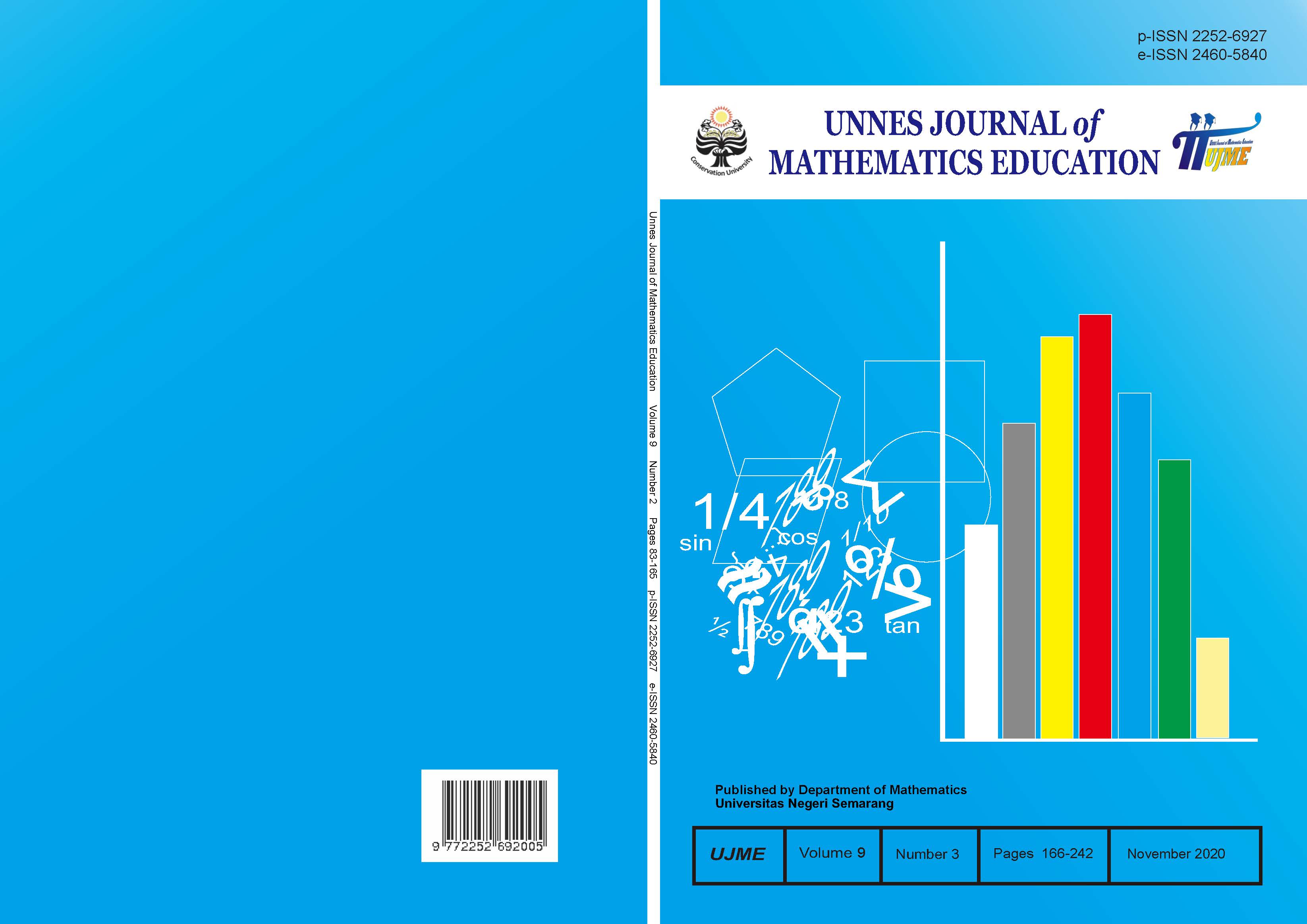Mathematical communication ability viewed from mathematical anxiety in Team Assisted Individualization using Edmodo
##plugins.themes.academic_pro.article.main##
Abstract
This study aims to find out that mathematics learning using Edmodo-assisted TAI learning effectively affects students 'mathematical communication skills and describes students' mathematical communication skills through Edmodo-assisted TAI learning in terms of mathematical anxiety. The method used in this study is a mixed-method with a sequential explanatory design. Data collection methods used were tests, observations, questionnaires, and interviews. This study's population were students in grade 8 from one of the State Junior High School in Semarang for the 2019/2020 school year, using a random sampling technique that selected two classes, namely 8A class students as the experimental class and 8B class students as the control class. The results showed that: (1) students' mathematical communication skills using the Edmodo-assisted TAI model exceeded minimum completeness criteria and classical completeness; (2) the mathematical communication skills of students who use the Edmodo assisted TAI model is better than the mathematical communication skills of students who use Edmodo assisted direct instruction learning; (3) students with a low level of mathematical anxiety can meet all indicators; (4) students with medium mathematical anxiety can meet five of the six indicators; (5) students with high mathematical anxiety are only able to meet four of the six indicators of mathematical communication skills.
##plugins.themes.academic_pro.article.details##
References
Agustyaningrum, N. (2011). Implementasi model pembelajaran learning cycle 5E untuk meningkatkan kemampuan komunikasi matematis siswa kelas IX B SMP Negeri 2 Sleman (Implementation of the 5E learning cycle learning model to improve the mathematical communication skills of grade 9B students of SMP Negeri 2 Sleman). In Seminar Nasional Matematika dan Pendidikan Matematika (Vol. 377).
Alimatunnisa, L., Rochmad, & M. Kharis. 2017. Kemampuan Penalaran Matematis Siswa Kelas VIII dalam PBL Bertema Ditinjau dari Kecemasan Matematika (Mathematical Reasoning Ability of Class VIII Students in Themed PBL in terms of Mathematical Anxiety). Unnes Journal of Mathematics Education (UJME), 6(2): 2-9
Argianti, A., K. Wijayanti, & Mulyono. 2017. Student’s Mathematical Reasoning Ability in Learning of Model Team Assisted Individualization Based on Assesment for Learning. Unnes Journal of Mathematics Education (UJME), 6(...): 2-9.
Clark, K.K. 2005. Strategies for Building Mathematical Communication in the Middle School Classroom: Modeled in Professional Development, Implemented in the Classroom. Current Issues in Middle Level Education, 11(2): 1-12.
Creswell, J. W. 2016. Research Design Pendekatan Kualitatif, Kuantitatif, dan Mixed. Yogyakarta: Pustaka Pelajar.
Dharma, I.D.P.P.W., E. Pujiastuti, & M. Harianja. Penerapan Model Pembelajaran TPS (Think pair-Share) untuk Meningkatkan Kemampuan Komunikasi Matematis dan Percaya Diri Peserta Didik Kelas X Mipa 1 SMA Negeri 6 Semarang Pada Materi Sistem Persamaan Linear Tiga Variabel Tahun Pelajaran 2018/2019 (Application of the TPS (Think pair-Share) Learning Model to Improve Mathematical Communication Ability and Confidence of Students in Class X Mipa 1 SMA Negeri 6 Semarang on the Material of Three Variable Linear Equation Systems for the 2018/2019 Academic Year). PRISMA, Prosiding Seminar Nasional Matematika 2, 239-246.
Peraturan Menteri Pendidikan dan Kebudayaan Republik Indonesia Nomor 20 Tahun 2003 Tentang Sistem Pendidikan Nasional (Decree of The Indonesian Minister of Education and Culture Number 20, 2003).
Peraturan Menteri Pendidikan dan Kebudayaan Republik Indonesia Nomor 23 Tahun 2006 Tentang Standar Kompetensi Lulusan Untuk Satuan Pendidikan Dasar Dan Menengah (Decree of The Indonesian Minister of Education and Culture Number 23, 2006)
Kemendikbud. Hasil PISA Indonesia 2018: Akses Makin Meluas, Saatnya Tingkatkan Kualitas. (PISA Indonesia 2018 Results: Wider Access, Time to Improve Quality) Available in https://www.kemdikbud.go.id/main/blog/2019/12/hasil-pisa-indonesia-2018-akses-makin-meluas-saatnya-tingkatkan-kualitas diakses 12 April 2020)
Kurniawati, M. (2012). Penerapan Pembelajaran Kooperatif Tipe TAI (Team Assisted Individualization) Untuk Meningkatkan Keaktifan Dan Prestasi Belajar Matematika Siswa Kelas V MI YAPPI Mulusan Paliyan Gunungkidul (Implementation of Team Assisted Individualization Type Cooperative Learning to Increase Mathematics Learning Activeness and Achievement of Class V Students at MI YAPPI Mulusan Paliyan Gunungkidul). (Undergraduate Thesis) Universitas Islam Negeri Sunan Kalijaga.Yogyakarta.
Mahmood, Sadia dan Tahira Khatoon. 2011. Devloment and Validation of the Mathematics Anxiety Scale for Secondary and Senior Secondary and Senior Secondary School Students. British Journal of Art and Social Sciences 2(2): 170
Mubarika, M. P. 2017. Penerapan Model Cooperative Learning Tipe Team Assisted Individualization (TAI) untuk Meningkatkan Kemampuan Penalaran dan Komunikasi Matematis serta Mengembangkan Self-Efficacy Peserta Didik SMA (Application of the Team Assisted Individualization (TAI) Cooperative Learning Model to Improve Mathematical Reasoning and Communication Ability and Developing Self-Efficacy of High School Students). Pasundan Journal of Research in Mathematics Learning and Education, 2(2) : 62 – 82.
NCTM. 2000. Principles and Standards for School Mathematics. Available in www.nctm.org [accessed 25-07-2019]
Sugiyono. 2017. Metode Penelitian Pendidikan. Bandung: Alfabeta.
